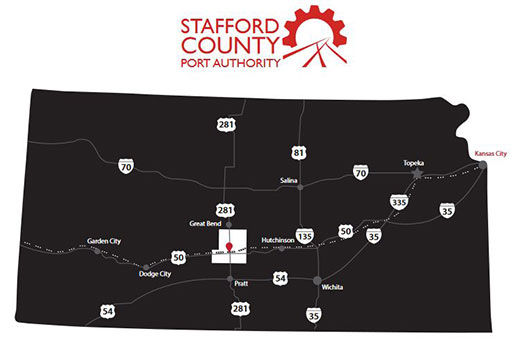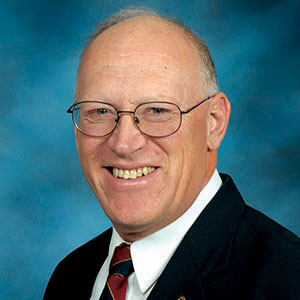
Stafford County Port Authority map | Download this photo
Kansas Profile – Now That’s Rural: Carolyn Dunn, port authority
April 19, 2023
By Ron Wilson, director of the Huck Boyd National Institute for Rural Development at Kansas State University
“Let’s go to the port.” If that calls to mind a big harbor full of ships and seagulls, think again.
There are other kinds of ports such as an airport – or a railport. Today we’ll learn about a rural Kansas county that is using a port authority to support railroad infrastructure so as to benefit the local economy.
During the last two weeks, we met Carolyn Dunn, president of the Stafford County Port Authority and past director of economic development in Stafford County. In the conclusion of this three-part series, we will learn about a port authority.
Stafford County is an agriculturally-based county in the middle of Kansas. One of its assets is a railroad line.
When Dunn first took the job as county economic development director, she was approached by three companies that were interested in establishing a large grain car loading facility along the railroad in the county. In each case, the deals did not pencil out, and the companies went elsewhere.
“We had to figure out how we could make this viable for them,” Dunn said. “Rather than those companies having to absorb all the cost of land and track, we looked for a way to structure this so that it makes it advantageous to attract businesses.”
Her research on alternatives led to something called a port authority. This happened to be the same legal structure that a Kansas leader named Huck Boyd had successfully used to support railroad service after the Rock Island Railroad closed in northwest Kansas.
A port authority is a quasi-governmental, special use district authorized to operate transportation infrastructure. In a sense, it might function like an airport or water port, but in Kansas it has been used with railroads. Typically, the port authority would own the land and railroad sidings and then lease access to companies that ship goods.
Stafford County Economic Development sought to use the port authority to establish a local rail transloading facility with industrial park. This would mean building a loop to the main railroad with space for loading and unloading facilities. This would allow trains and trucks to receive and transfer cargo such as grain or manufactured products.
Establishing a port authority requires state legislative approval. The Kansas Legislature authorized the Stafford County port authority in 2014. Stafford County Commissioners authorized formation of it in 2015. A Port Authority Board of Directors was appointed by the county commissioners. The county then contracted with a K-State agricultural economics professor to conduct a feasibility study on how best to implement it.
A grant was received to do the engineering and legal work. Potential sites were evaluated. A large grain handling company signed a letter of intent to build a unit car loading facility there.
Five million dollars was raised for the project. In 2022, a 256 acre site was purchased near two major highways and next to the railroad right of way.
Dunn transitioned from economic development director to her new role as president of the port authority. Much work remains to be done on the project.
If all goes as planned, this project would stimulate an estimated $15 million in private investment initially by an anchor grain-handling tenant. Improved efficiency in grain transportation should improve local grain prices, adding $7.5 to $9 million annually into the local economy.
“In addition to the seasonal shipment of grain at harvest time, we think this can benefit industrial shippers in the county by providing a local point of access to the railroad for companies that don’t have their own rail siding,” Dunn said.
One example would be Hudson Cream Flour, a business we have previously profiled. That company is located in the rural Stafford County community of Hudson, population 95 people. Now, that’s rural.
For more information, see www.staffordport.com.
It’s time to leave the port, but there’s no ships or seagulls. This would be a railroad port. We salute Carolyn Dunn and the Stafford County Port Authority for making a difference with innovative thinking and action.
Will this achieve positive results? Yes - I have it on good authority.
Audio and text files of Kansas Profiles are available at http://www.kansasprofile.com. For more information about the Huck Boyd Institute, interested persons can visit http://www.huckboydinstitute.org.
***
The mission of the Huck Boyd National Institute for Rural Development is to enhance rural development by helping rural people help themselves. The Kansas Profile radio series and columns are produced with assistance from the K-State Research and Extension Department of Communications News Media Services unit. A photo of Ron Wilson is available at http://www.ksre.ksu.edu/news/sty/RonWilson.htm. Audio and text files of Kansas Profiles are available at http://www.kansasprofile.com. For more information about the Huck Boyd Institute, interested persons can visit http://www.huckboydinstitute.org.


